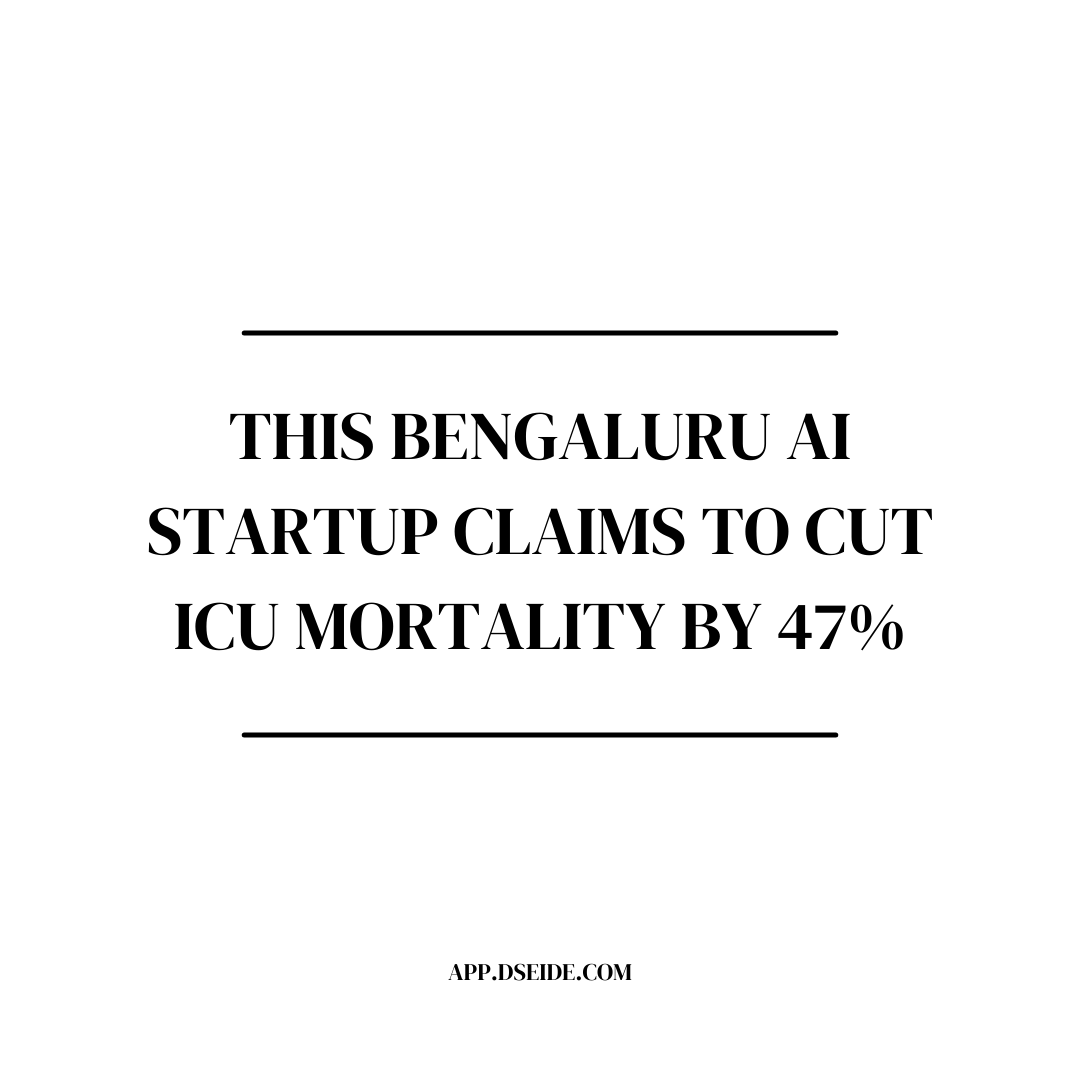Critical care in India faces a major crunch, with estimates suggesting only 2.3 ICU beds per 100,000 population. Furthermore, intensivists or critical care doctors are also in short supply, with only 5,000-6,000 trained professionals in our country. This shortage becomes a bigger threat in smaller towns and non-metro regions, leading to unfortunate, preventable deaths.
A Bengaluru-based healthcare startup, Cloudphysician, aims to address this disparity with AI.
ICU Care 2.0
Cloudphysician was founded in 2017 by Dileep Raman and Dhruv Joshi, two US board-certified intensivists who have witnessed the healthcare system in the West. They built the platform with a mission to use AI and telemedicine to bridge the skill and resource gap in India’s critical care infrastructure.
By connecting ICUs through high-quality video and bedside data analytics, Cloudphysician looks to improve patient outcomes in both neonatal and adult critical care.
“We have approximately 3.5 lakh ICU beds in the country. However, for a country our size, we need between 8 to 10 lakh ICU beds,” said Raman in an exclusive interaction with AIM.
“It’s not that you put a bed and a ventilator and add some devices, and it becomes an ICU bed. Besides the must-have hardware and the infrastructure, you also need skilled people to run it and a set of processes that make the high-quality ICU function. That’s what makes an ICU bed,” explained Raman.
Healthcare Operational AI
Cloudphysician uses a combination of multimodal AI models, incorporating inputs from video feeds, lab results, medical records, ambient audio, and established medical guidelines. This integrated approach allows the AI to detect critical issues, such as potential infections or tube disconnections, and provide actionable insights to doctors in real time.
“So it is not about predicting who is going to get worse or better. It’s more about analysing what exactly is going on because that is what enhances the efficiency of the doctor with us,” explained Raman.
They use a combination of computer vision models for visual analysis and LLMs for reasoning and recommendations. Raman said they also leverage platforms like Google Cloud and OpenAI alongside their in-house models.
The startup currently covers over 1,500 ICU beds across 200 hospitals in more than 100 cities throughout India and has even demonstrated a significant impact on reducing mortality by up to 47% in certain ICUs.
A few months ago, the startup raised $10.5 million in a funding round led by PeakXV Partners, Elevar Equity and Panthera Peak.
Source: analyticsindiamag
#healthcarestartup #startupfunding #dseide
A Bengaluru-based healthcare startup, Cloudphysician, aims to address this disparity with AI.
ICU Care 2.0
Cloudphysician was founded in 2017 by Dileep Raman and Dhruv Joshi, two US board-certified intensivists who have witnessed the healthcare system in the West. They built the platform with a mission to use AI and telemedicine to bridge the skill and resource gap in India’s critical care infrastructure.
By connecting ICUs through high-quality video and bedside data analytics, Cloudphysician looks to improve patient outcomes in both neonatal and adult critical care.
“We have approximately 3.5 lakh ICU beds in the country. However, for a country our size, we need between 8 to 10 lakh ICU beds,” said Raman in an exclusive interaction with AIM.
“It’s not that you put a bed and a ventilator and add some devices, and it becomes an ICU bed. Besides the must-have hardware and the infrastructure, you also need skilled people to run it and a set of processes that make the high-quality ICU function. That’s what makes an ICU bed,” explained Raman.
Healthcare Operational AI
Cloudphysician uses a combination of multimodal AI models, incorporating inputs from video feeds, lab results, medical records, ambient audio, and established medical guidelines. This integrated approach allows the AI to detect critical issues, such as potential infections or tube disconnections, and provide actionable insights to doctors in real time.
“So it is not about predicting who is going to get worse or better. It’s more about analysing what exactly is going on because that is what enhances the efficiency of the doctor with us,” explained Raman.
They use a combination of computer vision models for visual analysis and LLMs for reasoning and recommendations. Raman said they also leverage platforms like Google Cloud and OpenAI alongside their in-house models.
The startup currently covers over 1,500 ICU beds across 200 hospitals in more than 100 cities throughout India and has even demonstrated a significant impact on reducing mortality by up to 47% in certain ICUs.
A few months ago, the startup raised $10.5 million in a funding round led by PeakXV Partners, Elevar Equity and Panthera Peak.
Source: analyticsindiamag
#healthcarestartup #startupfunding #dseide
Critical care in India faces a major crunch, with estimates suggesting only 2.3 ICU beds per 100,000 population. Furthermore, intensivists or critical care doctors are also in short supply, with only 5,000-6,000 trained professionals in our country. This shortage becomes a bigger threat in smaller towns and non-metro regions, leading to unfortunate, preventable deaths.
A Bengaluru-based healthcare startup, Cloudphysician, aims to address this disparity with AI.
ICU Care 2.0
Cloudphysician was founded in 2017 by Dileep Raman and Dhruv Joshi, two US board-certified intensivists who have witnessed the healthcare system in the West. They built the platform with a mission to use AI and telemedicine to bridge the skill and resource gap in India’s critical care infrastructure.
By connecting ICUs through high-quality video and bedside data analytics, Cloudphysician looks to improve patient outcomes in both neonatal and adult critical care.
“We have approximately 3.5 lakh ICU beds in the country. However, for a country our size, we need between 8 to 10 lakh ICU beds,” said Raman in an exclusive interaction with AIM.
“It’s not that you put a bed and a ventilator and add some devices, and it becomes an ICU bed. Besides the must-have hardware and the infrastructure, you also need skilled people to run it and a set of processes that make the high-quality ICU function. That’s what makes an ICU bed,” explained Raman.
Healthcare Operational AI
Cloudphysician uses a combination of multimodal AI models, incorporating inputs from video feeds, lab results, medical records, ambient audio, and established medical guidelines. This integrated approach allows the AI to detect critical issues, such as potential infections or tube disconnections, and provide actionable insights to doctors in real time.
“So it is not about predicting who is going to get worse or better. It’s more about analysing what exactly is going on because that is what enhances the efficiency of the doctor with us,” explained Raman.
They use a combination of computer vision models for visual analysis and LLMs for reasoning and recommendations. Raman said they also leverage platforms like Google Cloud and OpenAI alongside their in-house models.
The startup currently covers over 1,500 ICU beds across 200 hospitals in more than 100 cities throughout India and has even demonstrated a significant impact on reducing mortality by up to 47% in certain ICUs.
A few months ago, the startup raised $10.5 million in a funding round led by PeakXV Partners, Elevar Equity and Panthera Peak.
Source: analyticsindiamag
#healthcarestartup #startupfunding #dseide





